HI5013 Assignment: The Role of Corporate Social Responsibility
VerifiedAdded on 2022/10/01
|7
|1865
|95
Essay
AI Summary
This essay provides an in-depth examination of Corporate Social Responsibility (CSR), defining it as the ethical and sustainable practices of businesses. It explores CSR's importance in aligning with stakeholder interests, including employees, communities, and the environment. The essay delves into CSR theories, such as utilitarian, relational, and managerial approaches, and their application within international concerns. It highlights practical implications, including CSR assessment, strategy, and implementation, with examples like ITC, Nestle, Starbucks, Coca-Cola, and Visa. The essay also discusses HR's role in supporting CSR, the triple bottom line framework, and the benefits of CSR for brand recognition, customer loyalty, and overall organizational success. The conclusion emphasizes CSR's role in sustainable operations and its relative benefits to organizations.

MANAGING ACROSS BORDERS
Paraphrase This Document
Need a fresh take? Get an instant paraphrase of this document with our AI Paraphraser
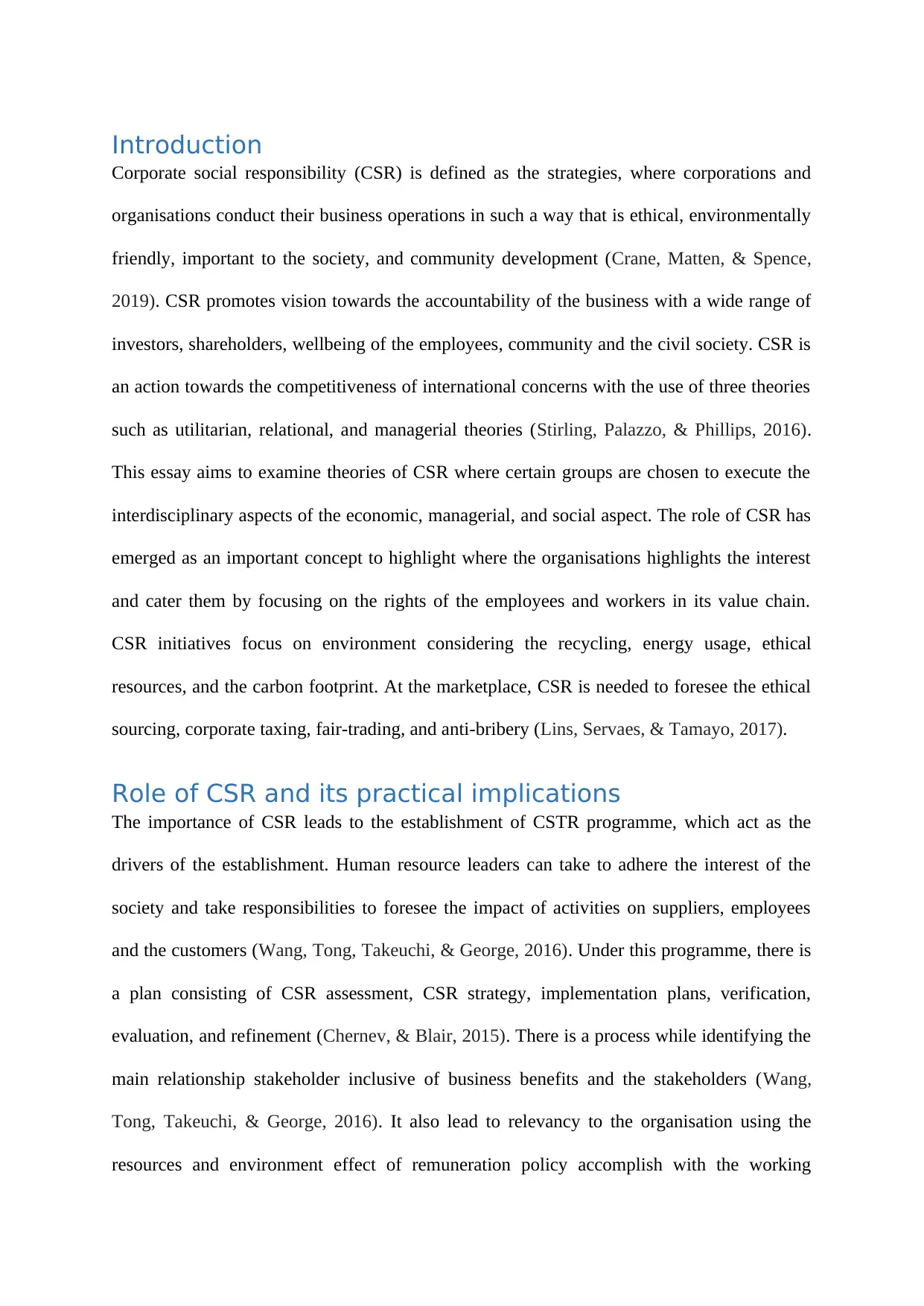
Introduction
Corporate social responsibility (CSR) is defined as the strategies, where corporations and
organisations conduct their business operations in such a way that is ethical, environmentally
friendly, important to the society, and community development (Crane, Matten, & Spence,
2019). CSR promotes vision towards the accountability of the business with a wide range of
investors, shareholders, wellbeing of the employees, community and the civil society. CSR is
an action towards the competitiveness of international concerns with the use of three theories
such as utilitarian, relational, and managerial theories (Stirling, Palazzo, & Phillips, 2016).
This essay aims to examine theories of CSR where certain groups are chosen to execute the
interdisciplinary aspects of the economic, managerial, and social aspect. The role of CSR has
emerged as an important concept to highlight where the organisations highlights the interest
and cater them by focusing on the rights of the employees and workers in its value chain.
CSR initiatives focus on environment considering the recycling, energy usage, ethical
resources, and the carbon footprint. At the marketplace, CSR is needed to foresee the ethical
sourcing, corporate taxing, fair-trading, and anti-bribery (Lins, Servaes, & Tamayo, 2017).
Role of CSR and its practical implications
The importance of CSR leads to the establishment of CSTR programme, which act as the
drivers of the establishment. Human resource leaders can take to adhere the interest of the
society and take responsibilities to foresee the impact of activities on suppliers, employees
and the customers (Wang, Tong, Takeuchi, & George, 2016). Under this programme, there is
a plan consisting of CSR assessment, CSR strategy, implementation plans, verification,
evaluation, and refinement (Chernev, & Blair, 2015). There is a process while identifying the
main relationship stakeholder inclusive of business benefits and the stakeholders (Wang,
Tong, Takeuchi, & George, 2016). It also lead to relevancy to the organisation using the
resources and environment effect of remuneration policy accomplish with the working
Corporate social responsibility (CSR) is defined as the strategies, where corporations and
organisations conduct their business operations in such a way that is ethical, environmentally
friendly, important to the society, and community development (Crane, Matten, & Spence,
2019). CSR promotes vision towards the accountability of the business with a wide range of
investors, shareholders, wellbeing of the employees, community and the civil society. CSR is
an action towards the competitiveness of international concerns with the use of three theories
such as utilitarian, relational, and managerial theories (Stirling, Palazzo, & Phillips, 2016).
This essay aims to examine theories of CSR where certain groups are chosen to execute the
interdisciplinary aspects of the economic, managerial, and social aspect. The role of CSR has
emerged as an important concept to highlight where the organisations highlights the interest
and cater them by focusing on the rights of the employees and workers in its value chain.
CSR initiatives focus on environment considering the recycling, energy usage, ethical
resources, and the carbon footprint. At the marketplace, CSR is needed to foresee the ethical
sourcing, corporate taxing, fair-trading, and anti-bribery (Lins, Servaes, & Tamayo, 2017).
Role of CSR and its practical implications
The importance of CSR leads to the establishment of CSTR programme, which act as the
drivers of the establishment. Human resource leaders can take to adhere the interest of the
society and take responsibilities to foresee the impact of activities on suppliers, employees
and the customers (Wang, Tong, Takeuchi, & George, 2016). Under this programme, there is
a plan consisting of CSR assessment, CSR strategy, implementation plans, verification,
evaluation, and refinement (Chernev, & Blair, 2015). There is a process while identifying the
main relationship stakeholder inclusive of business benefits and the stakeholders (Wang,
Tong, Takeuchi, & George, 2016). It also lead to relevancy to the organisation using the
resources and environment effect of remuneration policy accomplish with the working
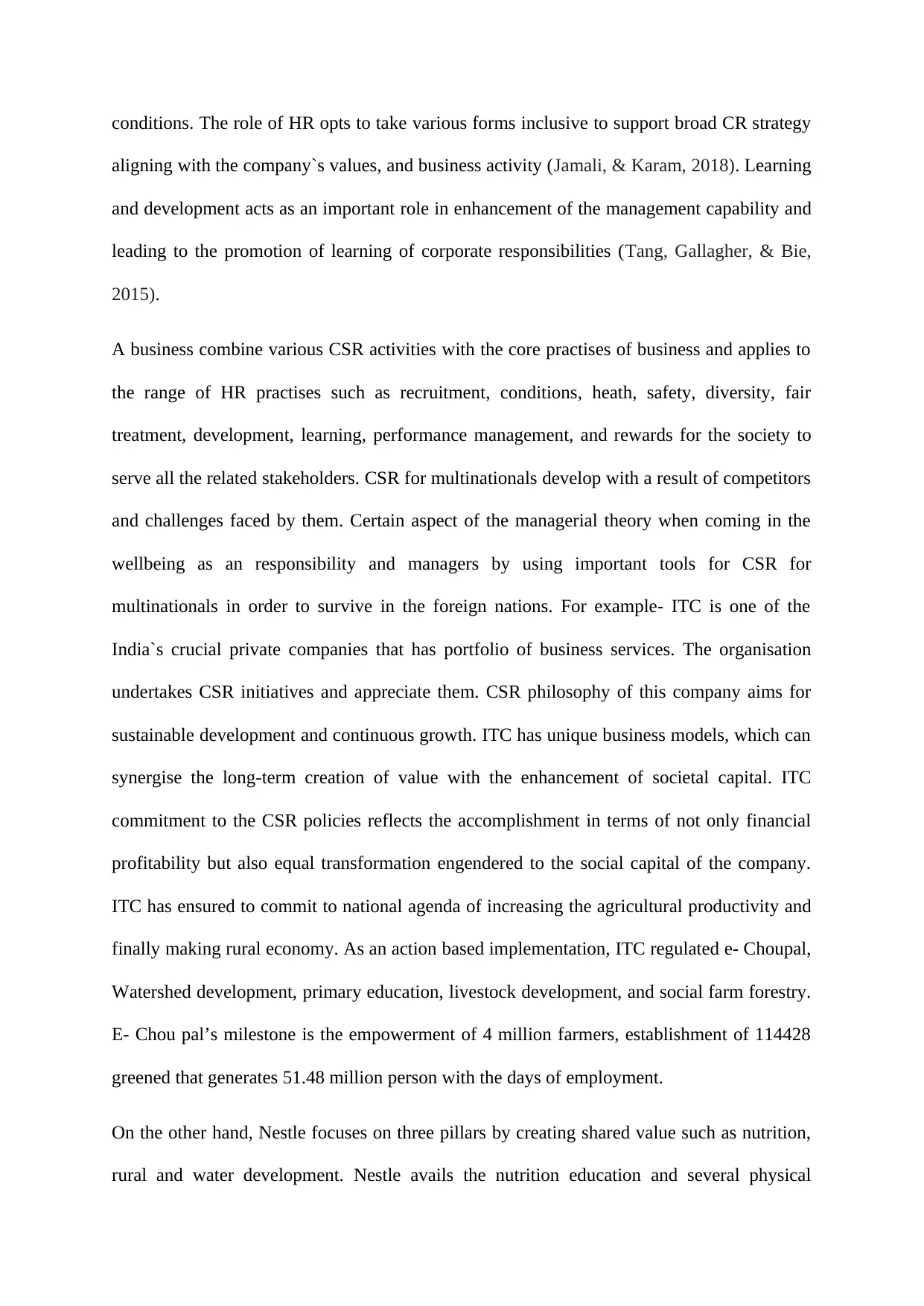
conditions. The role of HR opts to take various forms inclusive to support broad CR strategy
aligning with the company`s values, and business activity (Jamali, & Karam, 2018). Learning
and development acts as an important role in enhancement of the management capability and
leading to the promotion of learning of corporate responsibilities (Tang, Gallagher, & Bie,
2015).
A business combine various CSR activities with the core practises of business and applies to
the range of HR practises such as recruitment, conditions, heath, safety, diversity, fair
treatment, development, learning, performance management, and rewards for the society to
serve all the related stakeholders. CSR for multinationals develop with a result of competitors
and challenges faced by them. Certain aspect of the managerial theory when coming in the
wellbeing as an responsibility and managers by using important tools for CSR for
multinationals in order to survive in the foreign nations. For example- ITC is one of the
India`s crucial private companies that has portfolio of business services. The organisation
undertakes CSR initiatives and appreciate them. CSR philosophy of this company aims for
sustainable development and continuous growth. ITC has unique business models, which can
synergise the long-term creation of value with the enhancement of societal capital. ITC
commitment to the CSR policies reflects the accomplishment in terms of not only financial
profitability but also equal transformation engendered to the social capital of the company.
ITC has ensured to commit to national agenda of increasing the agricultural productivity and
finally making rural economy. As an action based implementation, ITC regulated e- Choupal,
Watershed development, primary education, livestock development, and social farm forestry.
E- Chou pal’s milestone is the empowerment of 4 million farmers, establishment of 114428
greened that generates 51.48 million person with the days of employment.
On the other hand, Nestle focuses on three pillars by creating shared value such as nutrition,
rural and water development. Nestle avails the nutrition education and several physical
aligning with the company`s values, and business activity (Jamali, & Karam, 2018). Learning
and development acts as an important role in enhancement of the management capability and
leading to the promotion of learning of corporate responsibilities (Tang, Gallagher, & Bie,
2015).
A business combine various CSR activities with the core practises of business and applies to
the range of HR practises such as recruitment, conditions, heath, safety, diversity, fair
treatment, development, learning, performance management, and rewards for the society to
serve all the related stakeholders. CSR for multinationals develop with a result of competitors
and challenges faced by them. Certain aspect of the managerial theory when coming in the
wellbeing as an responsibility and managers by using important tools for CSR for
multinationals in order to survive in the foreign nations. For example- ITC is one of the
India`s crucial private companies that has portfolio of business services. The organisation
undertakes CSR initiatives and appreciate them. CSR philosophy of this company aims for
sustainable development and continuous growth. ITC has unique business models, which can
synergise the long-term creation of value with the enhancement of societal capital. ITC
commitment to the CSR policies reflects the accomplishment in terms of not only financial
profitability but also equal transformation engendered to the social capital of the company.
ITC has ensured to commit to national agenda of increasing the agricultural productivity and
finally making rural economy. As an action based implementation, ITC regulated e- Choupal,
Watershed development, primary education, livestock development, and social farm forestry.
E- Chou pal’s milestone is the empowerment of 4 million farmers, establishment of 114428
greened that generates 51.48 million person with the days of employment.
On the other hand, Nestle focuses on three pillars by creating shared value such as nutrition,
rural and water development. Nestle avails the nutrition education and several physical
⊘ This is a preview!⊘
Do you want full access?
Subscribe today to unlock all pages.

Trusted by 1+ million students worldwide
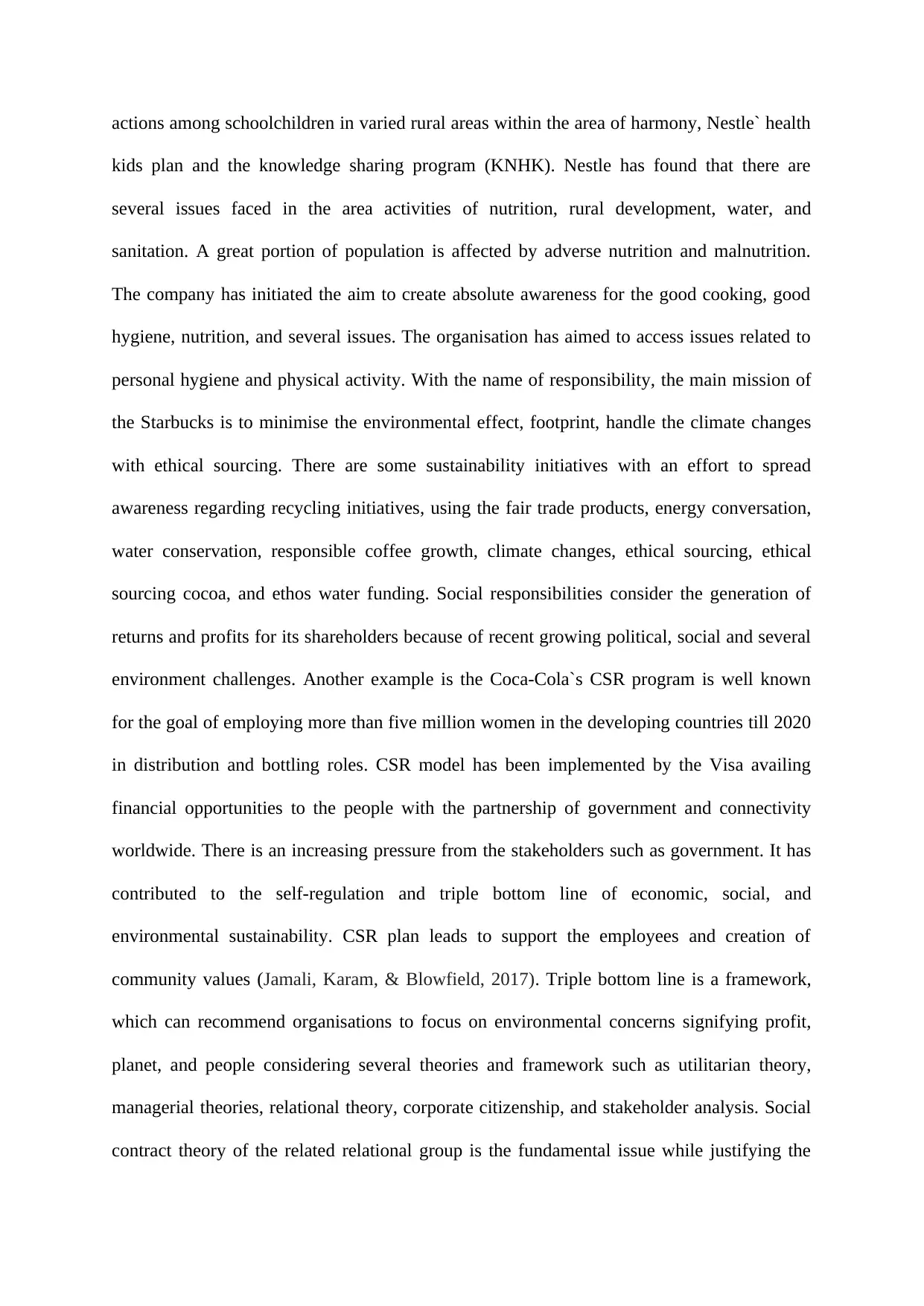
actions among schoolchildren in varied rural areas within the area of harmony, Nestle` health
kids plan and the knowledge sharing program (KNHK). Nestle has found that there are
several issues faced in the area activities of nutrition, rural development, water, and
sanitation. A great portion of population is affected by adverse nutrition and malnutrition.
The company has initiated the aim to create absolute awareness for the good cooking, good
hygiene, nutrition, and several issues. The organisation has aimed to access issues related to
personal hygiene and physical activity. With the name of responsibility, the main mission of
the Starbucks is to minimise the environmental effect, footprint, handle the climate changes
with ethical sourcing. There are some sustainability initiatives with an effort to spread
awareness regarding recycling initiatives, using the fair trade products, energy conversation,
water conservation, responsible coffee growth, climate changes, ethical sourcing, ethical
sourcing cocoa, and ethos water funding. Social responsibilities consider the generation of
returns and profits for its shareholders because of recent growing political, social and several
environment challenges. Another example is the Coca-Cola`s CSR program is well known
for the goal of employing more than five million women in the developing countries till 2020
in distribution and bottling roles. CSR model has been implemented by the Visa availing
financial opportunities to the people with the partnership of government and connectivity
worldwide. There is an increasing pressure from the stakeholders such as government. It has
contributed to the self-regulation and triple bottom line of economic, social, and
environmental sustainability. CSR plan leads to support the employees and creation of
community values (Jamali, Karam, & Blowfield, 2017). Triple bottom line is a framework,
which can recommend organisations to focus on environmental concerns signifying profit,
planet, and people considering several theories and framework such as utilitarian theory,
managerial theories, relational theory, corporate citizenship, and stakeholder analysis. Social
contract theory of the related relational group is the fundamental issue while justifying the
kids plan and the knowledge sharing program (KNHK). Nestle has found that there are
several issues faced in the area activities of nutrition, rural development, water, and
sanitation. A great portion of population is affected by adverse nutrition and malnutrition.
The company has initiated the aim to create absolute awareness for the good cooking, good
hygiene, nutrition, and several issues. The organisation has aimed to access issues related to
personal hygiene and physical activity. With the name of responsibility, the main mission of
the Starbucks is to minimise the environmental effect, footprint, handle the climate changes
with ethical sourcing. There are some sustainability initiatives with an effort to spread
awareness regarding recycling initiatives, using the fair trade products, energy conversation,
water conservation, responsible coffee growth, climate changes, ethical sourcing, ethical
sourcing cocoa, and ethos water funding. Social responsibilities consider the generation of
returns and profits for its shareholders because of recent growing political, social and several
environment challenges. Another example is the Coca-Cola`s CSR program is well known
for the goal of employing more than five million women in the developing countries till 2020
in distribution and bottling roles. CSR model has been implemented by the Visa availing
financial opportunities to the people with the partnership of government and connectivity
worldwide. There is an increasing pressure from the stakeholders such as government. It has
contributed to the self-regulation and triple bottom line of economic, social, and
environmental sustainability. CSR plan leads to support the employees and creation of
community values (Jamali, Karam, & Blowfield, 2017). Triple bottom line is a framework,
which can recommend organisations to focus on environmental concerns signifying profit,
planet, and people considering several theories and framework such as utilitarian theory,
managerial theories, relational theory, corporate citizenship, and stakeholder analysis. Social
contract theory of the related relational group is the fundamental issue while justifying the
Paraphrase This Document
Need a fresh take? Get an instant paraphrase of this document with our AI Paraphraser
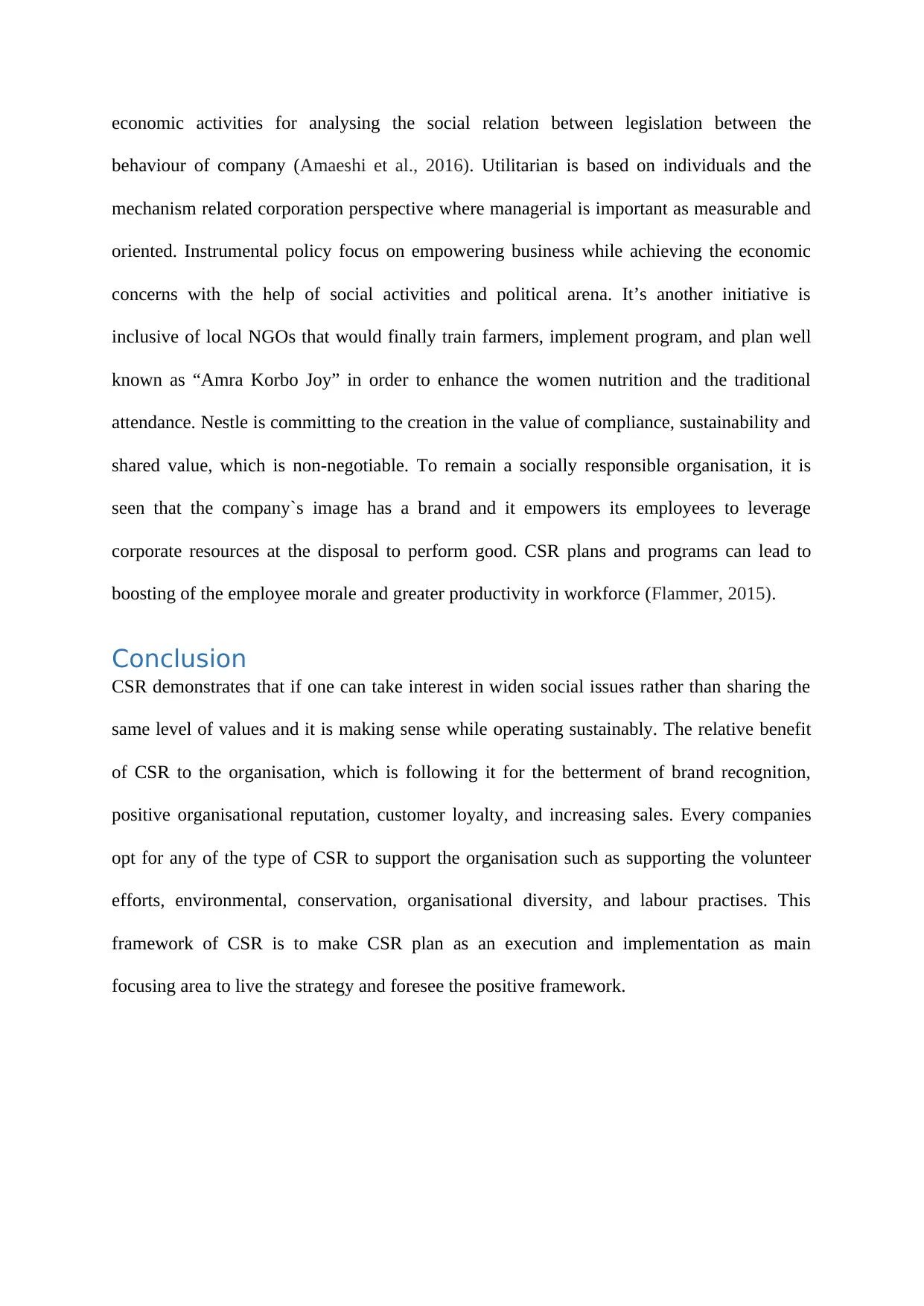
economic activities for analysing the social relation between legislation between the
behaviour of company (Amaeshi et al., 2016). Utilitarian is based on individuals and the
mechanism related corporation perspective where managerial is important as measurable and
oriented. Instrumental policy focus on empowering business while achieving the economic
concerns with the help of social activities and political arena. It’s another initiative is
inclusive of local NGOs that would finally train farmers, implement program, and plan well
known as “Amra Korbo Joy” in order to enhance the women nutrition and the traditional
attendance. Nestle is committing to the creation in the value of compliance, sustainability and
shared value, which is non-negotiable. To remain a socially responsible organisation, it is
seen that the company`s image has a brand and it empowers its employees to leverage
corporate resources at the disposal to perform good. CSR plans and programs can lead to
boosting of the employee morale and greater productivity in workforce (Flammer, 2015).
Conclusion
CSR demonstrates that if one can take interest in widen social issues rather than sharing the
same level of values and it is making sense while operating sustainably. The relative benefit
of CSR to the organisation, which is following it for the betterment of brand recognition,
positive organisational reputation, customer loyalty, and increasing sales. Every companies
opt for any of the type of CSR to support the organisation such as supporting the volunteer
efforts, environmental, conservation, organisational diversity, and labour practises. This
framework of CSR is to make CSR plan as an execution and implementation as main
focusing area to live the strategy and foresee the positive framework.
behaviour of company (Amaeshi et al., 2016). Utilitarian is based on individuals and the
mechanism related corporation perspective where managerial is important as measurable and
oriented. Instrumental policy focus on empowering business while achieving the economic
concerns with the help of social activities and political arena. It’s another initiative is
inclusive of local NGOs that would finally train farmers, implement program, and plan well
known as “Amra Korbo Joy” in order to enhance the women nutrition and the traditional
attendance. Nestle is committing to the creation in the value of compliance, sustainability and
shared value, which is non-negotiable. To remain a socially responsible organisation, it is
seen that the company`s image has a brand and it empowers its employees to leverage
corporate resources at the disposal to perform good. CSR plans and programs can lead to
boosting of the employee morale and greater productivity in workforce (Flammer, 2015).
Conclusion
CSR demonstrates that if one can take interest in widen social issues rather than sharing the
same level of values and it is making sense while operating sustainably. The relative benefit
of CSR to the organisation, which is following it for the betterment of brand recognition,
positive organisational reputation, customer loyalty, and increasing sales. Every companies
opt for any of the type of CSR to support the organisation such as supporting the volunteer
efforts, environmental, conservation, organisational diversity, and labour practises. This
framework of CSR is to make CSR plan as an execution and implementation as main
focusing area to live the strategy and foresee the positive framework.
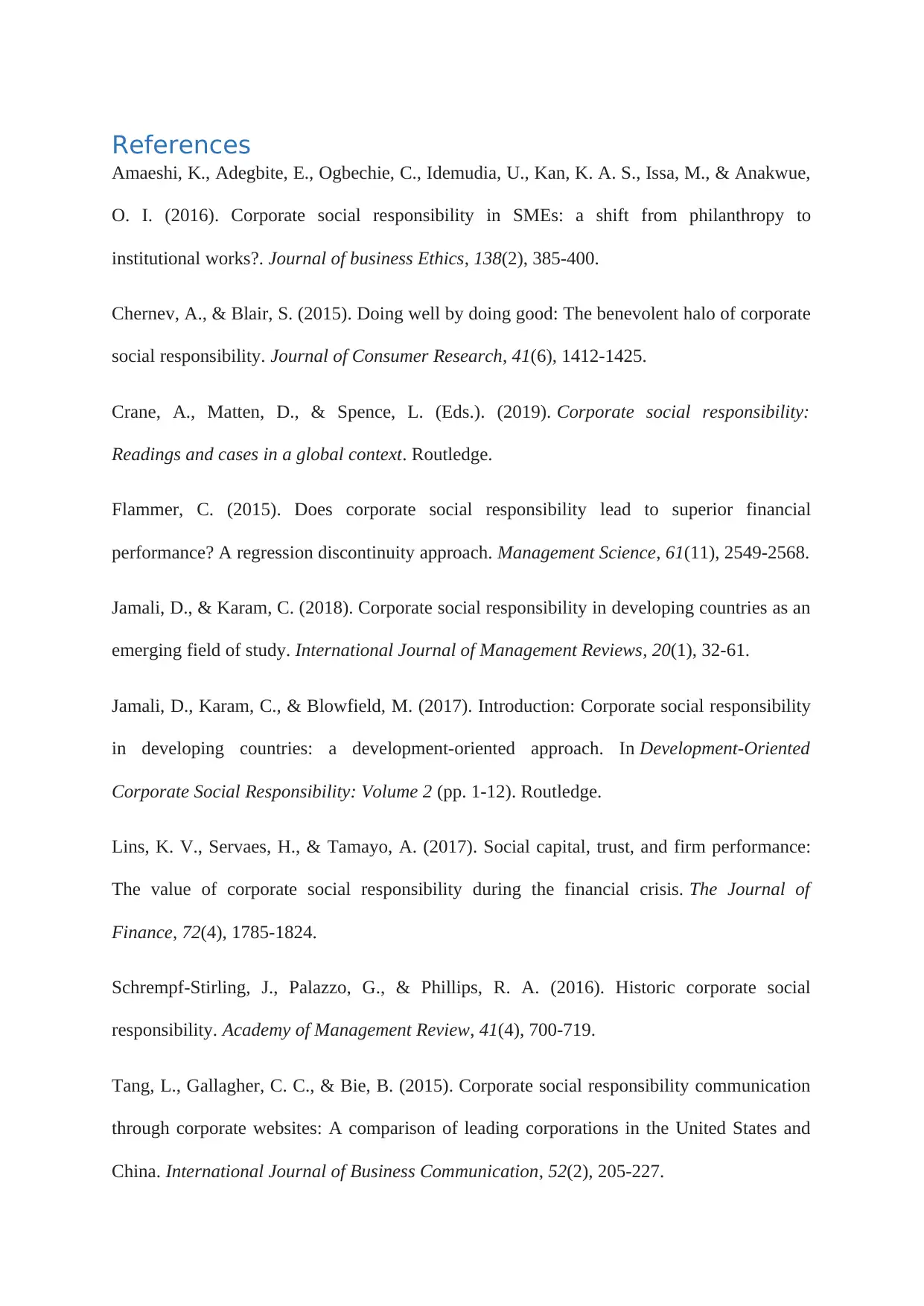
References
Amaeshi, K., Adegbite, E., Ogbechie, C., Idemudia, U., Kan, K. A. S., Issa, M., & Anakwue,
O. I. (2016). Corporate social responsibility in SMEs: a shift from philanthropy to
institutional works?. Journal of business Ethics, 138(2), 385-400.
Chernev, A., & Blair, S. (2015). Doing well by doing good: The benevolent halo of corporate
social responsibility. Journal of Consumer Research, 41(6), 1412-1425.
Crane, A., Matten, D., & Spence, L. (Eds.). (2019). Corporate social responsibility:
Readings and cases in a global context. Routledge.
Flammer, C. (2015). Does corporate social responsibility lead to superior financial
performance? A regression discontinuity approach. Management Science, 61(11), 2549-2568.
Jamali, D., & Karam, C. (2018). Corporate social responsibility in developing countries as an
emerging field of study. International Journal of Management Reviews, 20(1), 32-61.
Jamali, D., Karam, C., & Blowfield, M. (2017). Introduction: Corporate social responsibility
in developing countries: a development-oriented approach. In Development-Oriented
Corporate Social Responsibility: Volume 2 (pp. 1-12). Routledge.
Lins, K. V., Servaes, H., & Tamayo, A. (2017). Social capital, trust, and firm performance:
The value of corporate social responsibility during the financial crisis. The Journal of
Finance, 72(4), 1785-1824.
Schrempf-Stirling, J., Palazzo, G., & Phillips, R. A. (2016). Historic corporate social
responsibility. Academy of Management Review, 41(4), 700-719.
Tang, L., Gallagher, C. C., & Bie, B. (2015). Corporate social responsibility communication
through corporate websites: A comparison of leading corporations in the United States and
China. International Journal of Business Communication, 52(2), 205-227.
Amaeshi, K., Adegbite, E., Ogbechie, C., Idemudia, U., Kan, K. A. S., Issa, M., & Anakwue,
O. I. (2016). Corporate social responsibility in SMEs: a shift from philanthropy to
institutional works?. Journal of business Ethics, 138(2), 385-400.
Chernev, A., & Blair, S. (2015). Doing well by doing good: The benevolent halo of corporate
social responsibility. Journal of Consumer Research, 41(6), 1412-1425.
Crane, A., Matten, D., & Spence, L. (Eds.). (2019). Corporate social responsibility:
Readings and cases in a global context. Routledge.
Flammer, C. (2015). Does corporate social responsibility lead to superior financial
performance? A regression discontinuity approach. Management Science, 61(11), 2549-2568.
Jamali, D., & Karam, C. (2018). Corporate social responsibility in developing countries as an
emerging field of study. International Journal of Management Reviews, 20(1), 32-61.
Jamali, D., Karam, C., & Blowfield, M. (2017). Introduction: Corporate social responsibility
in developing countries: a development-oriented approach. In Development-Oriented
Corporate Social Responsibility: Volume 2 (pp. 1-12). Routledge.
Lins, K. V., Servaes, H., & Tamayo, A. (2017). Social capital, trust, and firm performance:
The value of corporate social responsibility during the financial crisis. The Journal of
Finance, 72(4), 1785-1824.
Schrempf-Stirling, J., Palazzo, G., & Phillips, R. A. (2016). Historic corporate social
responsibility. Academy of Management Review, 41(4), 700-719.
Tang, L., Gallagher, C. C., & Bie, B. (2015). Corporate social responsibility communication
through corporate websites: A comparison of leading corporations in the United States and
China. International Journal of Business Communication, 52(2), 205-227.
⊘ This is a preview!⊘
Do you want full access?
Subscribe today to unlock all pages.

Trusted by 1+ million students worldwide
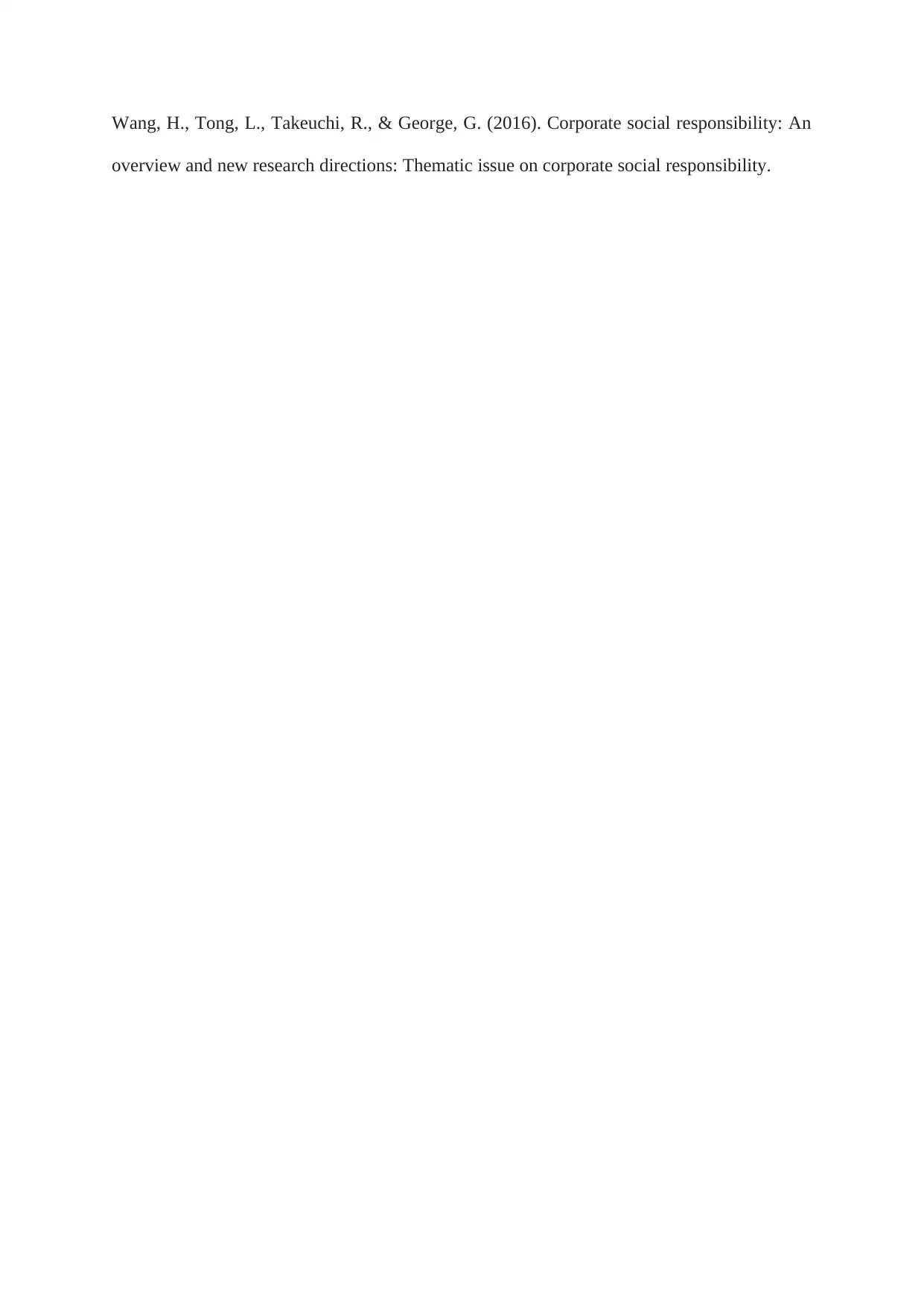
Wang, H., Tong, L., Takeuchi, R., & George, G. (2016). Corporate social responsibility: An
overview and new research directions: Thematic issue on corporate social responsibility.
overview and new research directions: Thematic issue on corporate social responsibility.
1 out of 7
Related Documents
Your All-in-One AI-Powered Toolkit for Academic Success.
+13062052269
info@desklib.com
Available 24*7 on WhatsApp / Email
![[object Object]](/_next/static/media/star-bottom.7253800d.svg)
Unlock your academic potential
Copyright © 2020–2026 A2Z Services. All Rights Reserved. Developed and managed by ZUCOL.





